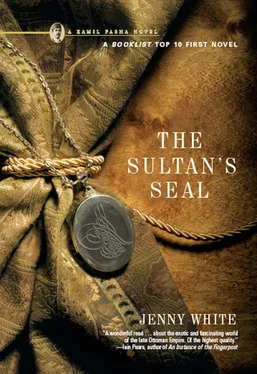Jenny White - The Sultan's seal
Здесь есть возможность читать онлайн «Jenny White - The Sultan's seal» весь текст электронной книги совершенно бесплатно (целиком полную версию без сокращений). В некоторых случаях можно слушать аудио, скачать через торрент в формате fb2 и присутствует краткое содержание. Жанр: Исторический детектив, на английском языке. Описание произведения, (предисловие) а так же отзывы посетителей доступны на портале библиотеки ЛибКат.
- Название:The Sultan's seal
- Автор:
- Жанр:
- Год:неизвестен
- ISBN:нет данных
- Рейтинг книги:5 / 5. Голосов: 1
-
Избранное:Добавить в избранное
- Отзывы:
-
Ваша оценка:
- 100
- 1
- 2
- 3
- 4
- 5
The Sultan's seal: краткое содержание, описание и аннотация
Предлагаем к чтению аннотацию, описание, краткое содержание или предисловие (зависит от того, что написал сам автор книги «The Sultan's seal»). Если вы не нашли необходимую информацию о книге — напишите в комментариях, мы постараемся отыскать её.
The Sultan's seal — читать онлайн бесплатно полную книгу (весь текст) целиком
Ниже представлен текст книги, разбитый по страницам. Система сохранения места последней прочитанной страницы, позволяет с удобством читать онлайн бесплатно книгу «The Sultan's seal», без необходимости каждый раз заново искать на чём Вы остановились. Поставьте закладку, и сможете в любой момент перейти на страницу, на которой закончили чтение.
Интервал:
Закладка:
This occasioned laughter among the men and even some titters from the women.
“Anyway, there is no such thing as a European civilization.” My father picked up the thread. “Europe is nothing more than a region, home to a lot of squabbling nations that can’t even agree among themselves. European civilization is a myth foisted upon us by those seeking to destroy our way of life and undermine our government. These radicals are working at the behest of the European powers, who would like nothing more than to divide us among ourselves and see the empire carved up into pieces that they can easily swallow.”
Hamza spoke up. “The empire is weak because we’ve allowed the Europeans to buy us. We’re in debt and whatever taxes we can flay from the backs of our poor peasants goes only to pay the interest. It’s not ideas that threaten the empire. Only ideas can save it.”
“There’s nothing civilized about your ideas,” a man countered heatedly. “They’re a threat to public morality.”
“Yes, that is so.” A murmur of approval rose from the company.
“You are absolutely correct.”
Amin Efendi added, with a sly glance at Hamza, “The other day, a woman of my extended family attended, if you can believe it, a political lecture.”
There was a ripple of laughter.
“A lecture by a man,” he added.
The men turned to each other in consternation. Several women stopped speaking. Without turning their heads, they continued to smile politely at their neighbors, but their ears clearly were on the debate across the room.
“I put a stop to that, of course.” A few of the men nodded appreciatively. “It is unbecoming for a man to lecture before women. It doesn’t matter what the subject is, or even whether it’s a lecture for women only. It’s immoral.”
Another man chimed in from an armchair across the room. His voice seemed too loud and more women stopped to listen.
“A woman’s calling in life is to marry and be a mother, to be a support to her husband, and to run the household. She doesn’t need to learn about science or politics. We don’t need women technicians or, Allah forbid, women politicians. A woman should learn the things she needs to know to run her home and be satisfied with that.”
The man with medals across his chest disagreed. “But you must admit, Fehmi Bey, that an educated woman makes a better mother.”
“No doubt, but after she marries and becomes a mother, all her energies should be focused on her duty, guarding the well-being of her family. These modern women are selfish and egotistical. They think only about themselves. If we all thought like that, it would lead to the destruction of our society. We need mothers and wives, women who can train the next generation.”
My voice, once launched, carried across the room like a bell chiming in an empty chamber. “The rights a modern society gives women are no different from the rights women enjoyed in the earliest periods of Islam. The rules laid down by the Prophet, peace be upon him, protect the rights of women. But over time, these rules have been diverted from their true purpose. By giving women rights and freedoms, we’re not aping Europe. We’re reaffirming our own tradition of respecting women. After all, Europe is far from being such an enviable paragon. It has long restricted the rights of its own women. Women have an important place in a modern, civilized Muslim society. They have a duty to society, as well as a duty to their families.”
I found I had risen from my chair. There was a hush, a heartbeat of silence, before Papa coughed and turned to speak to the man at his side.
“Proper women have always fulfilled their duty to society by being good mothers and wives,” he said. “There’s no need to change the family just to be modern. The traditional family is wide open to modern ideals, whether that family is in Europe or here. There’s no difference. What some consider Eastern manners are nothing more than the manners of the civilized world everywhere-solidarity, attachment to family, respect for elders, and concern for those who are weaker and dependent on you. The modern European family doesn’t reject these traditional values; there’s no contradiction there at all. Modern etiquette is an indicator of civilization everywhere. We must be open to this. I see no reason to fear the disintegration of society. Our family system is resilient, like a tree.”
Taking Papa’s cue, the men continued to converse, although the rumble of their voices had risen in intensity, as though their words had been driven to greater speed by embarrassment.
The women had begun whispering, the direction of their eyes indicating the destination of their tongues. I sat heavily, my entire body throbbing in time to my heart.
I could not see Hamza’s face, once I dared turn my eyes to him. His posture was guarded. I simply assumed he agreed and approved. I could think no other way. When I looked next, he was gone.
24
They turn into a narrow alley, Kamil leading the way. It is dark, but a faded moon sheds some light. The day has been rainy and unseasonably cold. Yellow mud has congealed into viscous waves and troughs. Bernie slips and Kamil catches his arm. A faint tendril of music snakes through the alleys. They follow it like the lost children in one of Karanfil’s tales. Kamil ducks through a low doorway into a smoky room lit by oil lamps. The proprietor hurries over and welcomes him effusively. He motions a young man to take their coats, then leads them to a table at the front of the room. Kamil whispers in his ear and the man bows his head and leads them instead to a small alcove at the back where they can converse undisturbed, but which still affords a view of the performance. A young male soprano is singing an Italian canto, accompanied by a mixture of European and Oriental instruments that add an air of lamentation to the song.
Two glasses of raki and small dishes of hummus, stuffed vegetables, yoghurt sauces, spiced fried liver, and bread appear magically on the table before them. As the evening wears on, empty dishes disappear, to be replaced by new and different delicacies. Empty glasses are refilled. Kamil and Bernie engage in spirited discussions on Italian opera and the role of folk songs in classical music.
“I must say,” Bernie comments, stretching his legs contentedly, “people here certainly know how to have a good time.” He nods at the plates spread across the table before them.
“We call it keyif. A feeling of well-being.” Kamil tilts his chin toward the sweating musicians and the tables buzzing with conversation and laughter. “In the presence of friends, fine food, and a pleasant setting.”
Very late, they stumble out of the low doorway, this time Bernie supporting Kamil. They head toward the Grande Rue de Pera, where carriages await customers until late into the night. Behind them, the compact shape of a man glides through the darkness, moving from one doorway to another. Suddenly an enormous black object hurtles forward and jumps on Bernie’s chest, its weight throwing him backward. Kamil reaches for his dagger. The kangal dog’s massive jaws struggle toward Bernie’s throat, kept only centimeters away by Kamil’s grip on the dog’s neck. A sharp blast, then a high-pitched scream, and the kangal falls heavily to the ground.
Kamil shields Bernie, who is doubled over and gasping for breath, a small silver pistol dangling from his left hand. A tavern door opens for a moment as a patron peers curiously into the street. The light spilling from inside illuminates the face of a man pressed against the wall, watching intently. His eyes meet Bernie’s before he slips around the corner into the alley.
Читать дальшеИнтервал:
Закладка:
Похожие книги на «The Sultan's seal»
Представляем Вашему вниманию похожие книги на «The Sultan's seal» списком для выбора. Мы отобрали схожую по названию и смыслу литературу в надежде предоставить читателям больше вариантов отыскать новые, интересные, ещё непрочитанные произведения.
Обсуждение, отзывы о книге «The Sultan's seal» и просто собственные мнения читателей. Оставьте ваши комментарии, напишите, что Вы думаете о произведении, его смысле или главных героях. Укажите что конкретно понравилось, а что нет, и почему Вы так считаете.












